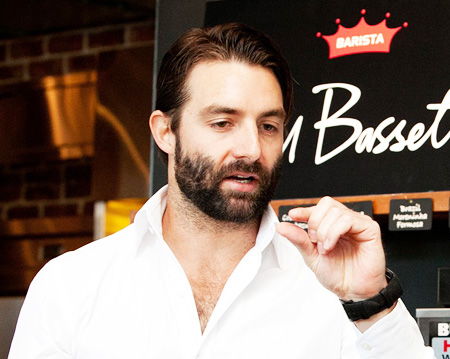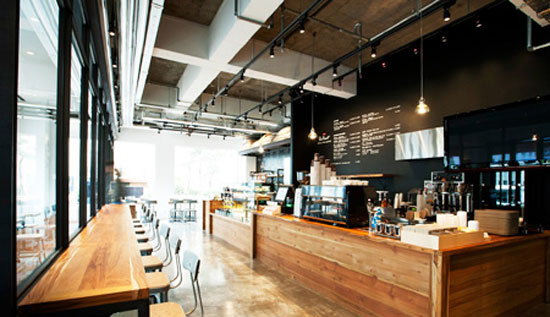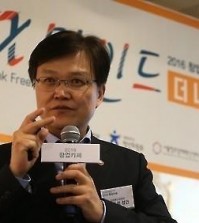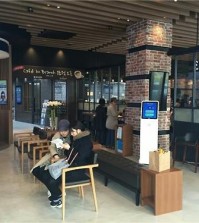- California Assembly OKs highest minimum wage in nation
- S. Korea unveils first graphic cigarette warnings
- US joins with South Korea, Japan in bid to deter North Korea
- LPGA golfer Chun In-gee finally back in action
- S. Korea won’t be top seed in final World Cup qualification round
- US men’s soccer misses 2nd straight Olympics
- US back on track in qualifying with 4-0 win over Guatemala
- High-intensity workout injuries spawn cottage industry
- CDC expands range of Zika mosquitoes into parts of Northeast
- Who knew? ‘The Walking Dead’ is helping families connect
Paul Bassett seeks to become leader in premium coffee market
By Kim Bo-eun

Paul Bassett, an Australian world champion barista, speaks at a store of the coffee chain named after him during a visit to Seoul. The coffee chain selects beans, roasts and brews the coffee according to Bassett’s standards and techniques. (Courtesy of Maeil Dairies)
A new coffee shop has a big plan percolating. The Paul Bassett coffee shop, which is named after the famous barista behind the company’s products, plans to expand into other markets.
Maeil Dairies, who opened a Paul Bassett coffee shop in Korea four years ago, says having Bassett on board sets its store apart from giant coffee competitors like Starbucks.
Maeil plans to take its unique business abroad, opening shops in Vietnam and Taiwan with plans for further expansion in the future.
“We will continue to expand when we find the right partner that has the resources, vision, insight and horsepower to be able to execute what we pursue,” Bassett told The Korea Times’ Business Focus during a visit to Seoul. Bassett was in the capital for a week to oversee work, conduct consumer coffee classes, and to promote the brand.
Success in Korean market
In 2009, Maeil Dairies’ coffee business under M’s Seed joined hands with the world champion barista Paul Bassett, who became the youngest contestant to become a world champion barista at the age 25 in 2003. The company selects coffee beans, roasts and brews the coffee according to Bassett’s standards and techniques.
Maeil and Bassett opened a store in Japan in 2005 with limited success, but the shop in Korea is doing well.
“The development of our brand took shape in a different form, and it seems like what happened in Korea is a winning formula,” Bassett said, adding that timing was a determining factor.
“The timing when we came into the marketplace here was rather opportune, being that the Korean market was really ready for the next level of quality beyond just a brand,” the Australian native said.
“Koreans want to have an improved coffee experience, with greater connection to provenance, of greater understanding of why my coffee tastes great, and there was an opportunity in the marketplace for that.”
Impending coffee market split
According to Bassett, there are essentially two markets ― one for regular coffee and another for specialty coffee. At a certain point, what was a single coffee market splits into two.
“Soon there will be a growing number of people that want something better than an average cup of joe. They’ll be happy to pay a premium for it and go searching for it, which is what happened in Australia,” he said. Bassett believes Australia is about 10 years more advanced than the Korean market.
Although the market here is still in the process of moving toward the split between being regular and specialty coffee, when the separation does take place, it will take off at an incredible speed, Bassett said.
Paul Bassett’s Lungo, a variation of hot water and a double espresso closest to the Americano, costs 4,600 won. This is the highest price among the Americano line, which usually costs between 3,000 and 4,000 won. At the moment, Paul Bassett is among the few if not only coffee chain in the domestic market that offers premium coffee.
“As of now, our competitors are existing chains like Starbucks, but our real competitors have yet to show their face,” he said.
Right now Bassett says coffee chains are still competing for a piece of the same pie, but as more people seek out premium coffee, the market will shape up differently.
“Consumers are slowly recognizing this difference and as the market grows, more competitors will join the arena,” Bassett said.
“I’d like to think of us pioneering growth and development of the premium market which we can be a premier player in.”
Developing premium market
Aside from selling premium coffee, Paul Bassett also offers classes where consumers can learn tips and tricks to make a killer cup of coffee from the master himself. The classes are part of developing a specialty coffee market. Media coverage of these classes is also considered an important part of the company’s overall strategy.
“I don’t feel there are any secrets that need to be kept. I’m happy to share it all,” said Bassett. “In this way, we’re pioneering the process of growing the marketplace.”
Based on what he sees at classes, Bassett believes the Korean coffee market is showing signs of readiness to split.
“I think the coffee in Korea for the last several years has been prime for this next stage of evolution,” the barista said. “There’s an appreciation for what we’re trying to do.”
Bassett says when consumers buy a cup of coffee they’re not just buying what’s in the cup, but what the brand stands for including its values, personality and culture. According to him, new and existing customers appreciate the culture his shops are brewing.
“We’re communicating, educating and answering the questions of thirsty consumers who are not only looking for coffee but also for knowledge about the coffee.”
“People don’t just want to eat for fuel or drink for thirst. They want to know where all of this is coming from, which is the idea of provenance.”
Paul Bassett has a variety of single provenance coffees. These coffees have an identity and give information about its origin. Consumers are able to learn about not only its place of origin, but also variety, specific processing, the name of the plot of land, the climate and farmer. This is opposed to bulk coffee from one specific region or country.
Bassett believes a growing number of people want to know where their food and drinks are coming from.
“People want to have a connection. They want to know the story of provenance; it makes the experience so much more pleasurable knowing where the coffee’s from and knowing what’s involved in the process to get it there.”
Expansion and quality control
The Paul Bassett brand itself focuses on selling premium coffee made by a world champion barista.
Boosted by its early success, and growing signs of readiness for continued expansion, the chain is steadily increasing the number of stores, but critics wonder if this growth will hamper the quality of the coffee.
“When you think mass you don’t think quality, but I don’t necessarily think that’s the case today. Maybe this was true in the past but there are many examples overcoming that stereotype,” the barista said.
“The sky is the limit, but we don’t want to do it unless we’re achieving the goals of consistency and quality we’ve set in place.”
In four years, 21 Paul Bassett stores have opened. According to Bassett, the chain plans to open at least 10 stores a year, and eventually step out of Seoul to expand into provincial areas. It plans to have around 100 stores by 2020.
Training baristas at stores is the key task for the coffee chain. Bassett visits Korea several times a year to oversee the systems.
“This is why we have the training facility offsite and an in-depth training manual. Our training is all about giving people the theoretical know-how and combining that with the technical execution,” Bassett said.
“We aim to achieve a combined united front so that consumers can go to all of our stores and have the same experience.”
Taking coffee a step further
As a professional barista, Bassett’s aim is to explore the sensory possibility coffee has, by continuing to strive to understand, improve and evolve.
However, Bassett says the price of coffee is not representative of the effort that’s put into it.
“Coffee has a cap on price as opposed to wine,” he said. “The price range is disproportionate to the effort that goes in.”
Bassett hopes this limiting factor changes in the future.
“For certain single provenance coffees which have a unique story and are of a significantly high quality, there should be a price differentiation that allows people to see and recognize that there is additional value.”

















